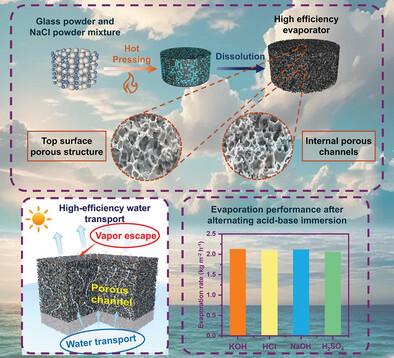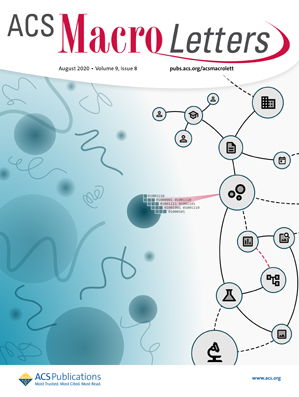高效多孔玻璃太阳能水蒸发器
IF 5.1
Q1 POLYMER SCIENCE
引用次数: 0
摘要
过度使用和污染加剧了全球水危机,并导致能源短缺和威胁。太阳能海水淡化提供了一种可持续的解决方案,研究人员正在开发光热材料和设计,以提高效率和可持续性。玻璃材料具有优异的化学稳定性,适用于酸性和碱性条件下的极端海水淡化。在这项工作中,我们开发了一种多孔玻璃蒸发器 (PGE),通过一种新颖的制造方法,将玻璃粉与可溶性盐混合,形成具有连续孔隙的结构,从而实现了极高的水蒸发效率。蒸发器的微观结构由微米级的孔隙组成,这些孔隙形成相互连接的多孔通道,有利于水的高效传输并防止盐分沉积。在一个太阳光照射下,PGE 在纯水中表现出卓越的太阳能蒸发性能,蒸发率达到 2.21 kg m-2 h-1,蒸发效率高达 98%。在海水和亚甲基蓝溶液等更复杂的介质中,PGE 也表现出卓越的蒸发能力,蒸发率分别达到 2.08 和 2.47 公斤米-2 小时-1。即使在酸性和碱性处理持续交替进行的情况下,PGE 仍能保持超过 2.0 kg m-2 h-1 的惊人蒸发率,再加上结构坚固,使其有望在极端环境中得到实际应用。本文章由计算机程序翻译,如有差异,请以英文原文为准。

Highly Efficient Porous Glass Solar Water Evaporator
The global water crisis, exacerbated by excessive use and pollution, has resulted in energy scarcity and threats. Solar desalination provides a sustainable fix, with researchers developing photothermal materials and designs to improve efficiency and sustainability. Glass materials, with their exceptional chemical stability, are suitable for extreme desalination in acidic and alkaline conditions. In this work, we have developed a porous glass evaporator (PGE) with exceptional water evaporation efficiency, achieved through a novel fabrication method that blends glass powders with soluble salts to create structure with continuous pores. The evaporator's microstructure comprises micrometer-scale pores that form interconnected porous channels, facilitating efficient water transport and preventing salt deposition. Under one sun irradiation, the PGE exhibits superior solar evaporation performance in pure water, achieving a rate of 2.21 kg m−2 h−1, with an evaporation efficiency of 98%. In more complex media, such as seawater and methylene blue solution, the PGE also displays excellent evaporation capabilities, reaching rates of 2.08 and 2.47 kg m−2 h−1, respectively. Even after sustained alternation between acidic and alkaline treatments, the PGE retains an impressive evaporation rate of over 2.0 kg m−2 h−1, coupled with structural robustness, making it a promising candidate for practical applications in extreme environments.
求助全文
通过发布文献求助,成功后即可免费获取论文全文。
去求助
来源期刊
CiteScore
10.40
自引率
3.40%
发文量
209
审稿时长
1 months
期刊介绍:
ACS Macro Letters publishes research in all areas of contemporary soft matter science in which macromolecules play a key role, including nanotechnology, self-assembly, supramolecular chemistry, biomaterials, energy generation and storage, and renewable/sustainable materials. Submissions to ACS Macro Letters should justify clearly the rapid disclosure of the key elements of the study. The scope of the journal includes high-impact research of broad interest in all areas of polymer science and engineering, including cross-disciplinary research that interfaces with polymer science.
With the launch of ACS Macro Letters, all Communications that were formerly published in Macromolecules and Biomacromolecules will be published as Letters in ACS Macro Letters.

 求助内容:
求助内容: 应助结果提醒方式:
应助结果提醒方式:


